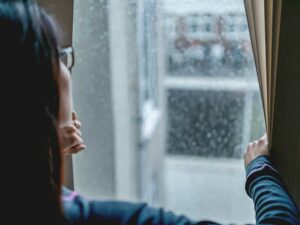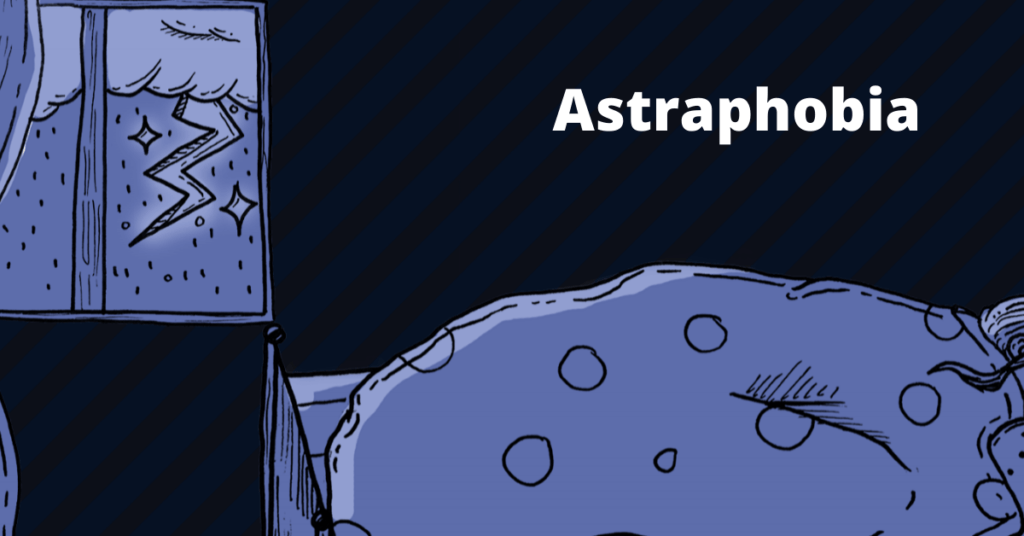Have you ever experienced a fear of storms? This is called astraphobia. Although many people believe that it’s just an irrational fear, there are actually some legitimate reasons for the anxiety that accompanies this phobia. In fact, in some cases, astraphobia is a type of panic disorder or agoraphobia. Read on to find out more about how to overcome your fear of storms.
Contents
What Is Astraphobia?
 Astraphobia is the fear of storms. It can be caused by a traumatic experience, such as being struck by lightning, or it can develop gradually over time. People with astraphobia often have other fears as well, such as fear of thunder or fear of wind. This fear can be debilitating, preventing people from going outside or doing activities they enjoy.
Astraphobia is the fear of storms. It can be caused by a traumatic experience, such as being struck by lightning, or it can develop gradually over time. People with astraphobia often have other fears as well, such as fear of thunder or fear of wind. This fear can be debilitating, preventing people from going outside or doing activities they enjoy.
How Common Is Astraphobia?
Astrophobia is relatively common, affecting millions of people around the world. It is more commonly seen in children and often goes away as they grow older, but for some, it never completely disappears.
Approximately one-third of people who experience a traumatic event related to storms will go on to develop astraphobia.
Out of this third, about one-third will only experience astraphobia during storms. The other third will have an ongoing fear of thunder or lightning even when there are no storms in the area.
Approximately 70% of those with astraphobia are women. Out of this group, most are young women between the ages of 18 and 30.
What Are The Symptoms Of Astraphobia?
People with astraphobia may experience a range of symptoms, including:
Anxious Feeling
Many people with astraphobia feel an anxious feeling in their chest or stomach when a storm is approaching. This may be accompanied by a rapid heart rate, nausea, and sweating.
Avoidance Behavior
People with astraphobia often try to avoid storms altogether. They may stay inside during bad weather, change their plans if they know there is going to be a storm, or panic if they are in the vicinity of a storm.
Physical Symptoms
Some people with astraphobia experience physical symptoms such as headaches, dizziness, or shortness of breath. These symptoms can occur when there is no storm present and are usually brought on by anxiety about storms.
Restlessness
Many people with astraphobia have a hard time sitting still during a storm. They may feel the need to constantly move or check on things and can’t relax until the storm is over.
What Are The Causes Of Astraphobia?
While the exact cause of astraphobia is not known, there are some common triggers that can bring on this fear. These include:
Past Experiences
Sometimes, someone may develop astraphobia due to past experiences. Perhaps they were in an earthquake or severe thunderstorm when young and this experience has left them with a fear of similar events. This is common for many people who have experienced trauma during their childhoods.
Being Struck By Lightning
Certain people appear to be at a higher risk for being struck by lightning than others, including those who work or play outdoors during bad weather and children. If someone experiences an electrical storm while playing outside as a child, they may develop astraphobia after experiencing such a traumatic event.
Bystander Effect
People often feel less fear when they are not alone during a storm. If someone is with another person who appears calm, the fear of storms might lessen for that individual as well. However, if there are multiple people present and one wave of panic, it can cause everyone else to panic as well. This is known as the bystander effect.
Genetics
Genetics also play a role in astraphobia. People who have family members with anxiety or panic disorders are more likely to develop this fear than those who do not. Some research has suggested that there is also a genetic link between astraphobia and epilepsy.
Environmental Triggers
Certain environmental triggers can also bring on astraphobia. These include a storm happening at the same time as other stressors, such as a job interview or an important sporting event. People who have experienced severe storms in their childhood may develop this fear during times of high stress later in life.
Diagnosis of Astraphobia
Diagnosis of astraphobia is usually based on a person’s symptoms and how they are impacting their life. If a person is only scared of storms during certain times, such as when they are pregnant or have young children, then it may not be classified as astraphobia.
The medical professional may also ask about the person’s family history and if they have any other anxiety disorders. He or she may also perform a physical exam to look for any other possible causes of the fear.
Treatment of Astraphobia
There is no one-size-fits-all approach to treating astraphobia. Treatment will vary depending on the individual’s symptoms and what is causing their fear of storms.
Some common treatments include:
Cognitive Behavioral Therapy (CBT)
Cognitive-behavioral therapy is a type of therapy that focuses on changing the way a person thinks about their fears. This therapy can help people learn how to control their reactions to storms and ultimately reduce their fear.
Medication
In some cases, medication can help to treat astraphobia. This could include antidepressants or anti-anxiety medications. These medications may be able to help reduce the symptoms, but they do not actually treat the fear.
Self-Help Techniques
Relaxation techniques and breathing exercises may also be helpful for people with astraphobia. These can help a person learn how to calm down during a storm or panic attack without relying on medication as much as possible.
Exposure Therapy
In exposure therapy, a therapist will expose an individual to their feared situation in order to change their reaction over time. This could include having someone practice going outside when it’s raining or watching videos of storms before and after working through treatment methods like CBT and self-help techniques first. The idea is that each time the response changes from fearful thoughts about weather events into more positive thoughts about them, the fear will diminish.
Self-Help Approaches
Some people choose to try self-help approaches first before seeing a therapist or getting medication. There are many books and websites available that can provide information on how to manage this disorder without professional treatment if desired. These resources can be especially helpful for those who live in areas where they cannot see a therapist due to geographical location or financial problems.
How To Overcome Astraphobia
These are some techniques to overcome astraphobia.
- Recognize that your fear is not logical and try to relax as much as possible during storms or panic attacks.
- Try using relaxation techniques such as deep breathing when you feel a panic attack coming on.
- Use positive affirmations (such as, “I can handle this” or “This will be over soon”) to help yourself calm down and fight the symptoms of anxiety.
- Gradually expose yourself to what you are afraid of by watching videos of how others weather through stormy conditions safely before trying it for real if necessary. This could include going outside in light rain at first, then heavy rain until finally working up to thunderstorms and tornadoes if that trigger more intense reactions from you.
- Keep a journal of your progress and be sure to reward yourself for any positive steps you make during treatment.
Conclusion
Astraphobia is a type of specific phobia that people can develop. This is astrapophobia and it manifests when the person begins to fear things like thunder, lightning, tornadoes, or other natural disasters due to their unpredictability. There are many treatments available for this condition including cognitive behavioral therapy, anti-anxiety medications, and group therapies so if you think you may have this issue don’t hesitate in seeking help from a professional mental health counselor.
If you are looking for affordable Online Counseling MantraCare can help: Book a trial therapy session


